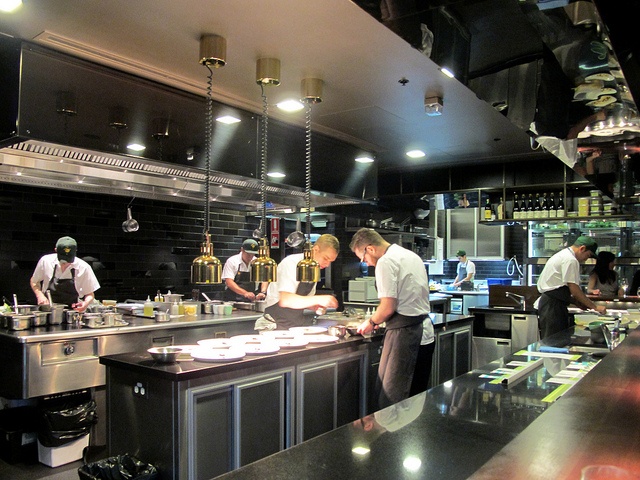A well-equipped commercial kitchen is the backbone of any successful food establishment. Whether it’s a restaurant, café, or catering business, having the right kitchen equipment ensures efficiency, consistency, and quality in food preparation. Modern commercial kitchens require a balance of high-performance appliances, ergonomic design, and reliable storage solutions. This article explores the essential kitchen equipment that every modern commercial kitchen should have, focusing on efficiency, safety, and food preservation.
1. Cooking Equipment
Cooking appliances are the heart of any commercial kitchen. Investing in the right equipment improves productivity and ensures that food is prepared with precision. Some of the must-have cooking appliances include:
- Ovens – Commercial ovens come in various types, including convection ovens, combi ovens, and deck ovens. Each serves a unique purpose, from baking pastries to roasting meats.
- Stoves and Ranges – Gas or electric stoves with multiple burners allow chefs to cook several dishes simultaneously.
- Grills and Griddles – These are essential for preparing grilled meats, pancakes, and sandwiches, offering versatility in menu preparation.
- Deep Fryers – Perfect for preparing crispy fried foods such as French fries, chicken, and seafood.
- Steamers – Ideal for cooking vegetables and seafood while retaining nutrients and flavors.
2. Refrigeration and Storage Equipment
Proper food storage is crucial in maintaining hygiene and preventing spoilage. Commercial kitchens require robust refrigeration solutions to keep ingredients fresh and ready for use.
- Walk-in Refrigerators and Freezers – Essential for large-scale storage of perishable ingredients, ensuring compliance with food safety standards.
- Reach-in Refrigerators and Freezers – Provide easy access to frequently used ingredients, minimizing disruptions in the cooking process.
- Under Counter Fridge – A compact and space-saving refrigeration solution that keeps essential ingredients within reach, enhancing workflow efficiency in fast-paced kitchens.
- Cold Storage Units – Used for storing bulk ingredients such as dairy products, meats, and vegetables.
- Dry Storage Racks – Designed to store non-perishable items like canned goods, spices, and baking ingredients in an organized manner.
3. Food Preparation Equipment
Prepping ingredients efficiently is vital to maintaining the pace of a commercial kitchen. The right tools make chopping, slicing, and mixing effortless.
- Cutting Boards and Knives – High-quality chef knives and color-coded cutting boards help maintain hygiene and efficiency.
- Food Processors – These machines significantly reduce prep time by chopping, slicing, and shredding vegetables, cheese, and meats.
- Mixers – Stand mixers and planetary mixers are essential for baking and dough preparation.
- Blenders and Immersion Blenders – Used for making sauces, soups, and smoothies.
- Meat Slicers – Essential for delis and sandwich shops that require precision slicing of meats and cheeses.
4. Food Holding and Serving Equipment
Once food is prepared, it must be kept at the right temperature before serving. Holding equipment ensures food stays warm and fresh for customers.
- Hot Holding Cabinets – Keep cooked food at a safe serving temperature without drying it out.
- Food Warmers and Heat Lamps – Ideal for buffet setups and quick-service restaurants to maintain food temperature.
- Chafing Dishes – Commonly used in catering and banquet settings to keep food warm for extended periods.
- Salad Bars and Cold Display Units – Perfect for displaying fresh salads, desserts, and cold appetizers while keeping them cool.
5. Dishwashing and Sanitation Equipment
Maintaining cleanliness and hygiene is a top priority in a commercial kitchen. Proper dishwashing equipment helps meet health standards and ensures a seamless workflow.
- Commercial Dishwashers – High-capacity dishwashers clean and sanitize dishes quickly, reducing labor costs and improving efficiency.
- Sinks and Faucets – Three-compartment sinks are commonly used for washing, rinsing, and sanitizing dishes manually.
- Grease Traps – Prevent grease and oil from clogging kitchen drainage systems.
- Handwashing Stations – Essential for maintaining hygiene among kitchen staff.
- Waste Disposal Systems – Includes trash compactors, composting bins, and recycling containers to manage kitchen waste effectively.
6. Baking Equipment
For bakeries and pastry shops, specialized baking equipment is necessary to produce high-quality baked goods.
- Dough Sheeters – Help roll out consistent dough for pastries, pizzas, and breads.
- Proofing Cabinets – Create the perfect environment for dough fermentation and rising.
- Deck and Convection Ovens – Used for baking everything from bread to cakes and cookies.
- Pastry Mixers and Dough Kneaders – Ensure smooth and even dough preparation.
- Cooling Racks – Allow baked goods to cool evenly after coming out of the oven.
7. Smallware and Kitchen Tools
In addition to large appliances, every commercial kitchen requires a variety of small tools and utensils to function effectively.
- Measuring Cups and Spoons – Ensure consistency in recipes and portion sizes.
- Mixing Bowls – Used for preparing sauces, batters, and dressings.
- Tongs, Spatulas, and Ladles – Essential tools for handling and serving food.
- Thermometers – Ensure food is cooked to the correct internal temperature to meet food safety regulations.
- Timers – Help maintain cooking precision and prevent overcooking or burning.
8. Ventilation and Safety Equipment
A safe and comfortable kitchen environment is essential for staff productivity and well-being. Proper ventilation and safety measures should be in place to prevent accidents.
- Exhaust Hoods and Ventilation Systems – Remove smoke, grease, and heat from the kitchen, maintaining air quality.
- Fire Suppression Systems – Protect against grease fires and ensure safety compliance.
- First Aid Kits – Essential for addressing minor injuries and ensuring staff safety.
- Protective Gear – Includes gloves, aprons, and non-slip shoes to reduce workplace accidents.
- Emergency Exits and Signage – Clearly marked exits and safety signs help in case of emergencies.
9. Beverage Equipment
For establishments that serve beverages, specialized equipment is necessary for preparing drinks efficiently.
- Coffee Machines – Essential for cafes and restaurants offering hot beverages.
- Juicers – Used for making fresh juices and smoothies.
- Ice Machines – Provide a steady supply of ice for drinks and food preservation.
- Water Filtration Systems – Ensure clean and purified water for beverages and cooking.
- Soda and Soft Drink Dispensers – Convenient for quick-service restaurants and bars.
Conclusion
Equipping a modern commercial kitchen with the right kitchen equipment is essential for operational efficiency, food safety, and customer satisfaction. From cooking appliances to refrigeration units like the under counter fridge, each piece of equipment plays a crucial role in the seamless functioning of a food establishment. Investing in high-quality and durable equipment ensures long-term success, reduces maintenance costs, and enhances overall productivity. By carefully selecting and maintaining essential kitchen equipment, businesses can create a professional and efficient kitchen environment that meets industry standards and exceeds customer expectations.










